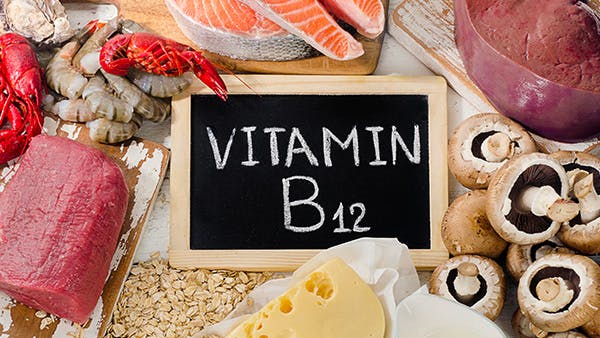How Much Vitamin B12 Should You Take a Day?

Vitamin B12 is essential for many bodily functions. Vitamin B12 is important for creating red blood cells, for helping nerves to function, and for synthesizing DNA.[1] A deficiency in vitamin B12 can lead to things like anemia, fatigue, weakness, and more.[1] Fortunately, it’s available in many foods we eat, and it’s included in multivitamins and other supplements. So how much vitamin B12 should we be getting each day? Read on to learn about the recommended doses of vitamin B12, how to get it in your diet, and whether you should consider a supplement.
Benefits of Vitamin B12
Vitamin B12 helps our bodies do many things, including:[3][4][5]
- Making DNA
- Producing red blood cells
- Aids in nerve health
Recommended Daily Intake of Vitamin B12
Like any nutrient, be sure to talk to your health care provider about how much vitamin B12 you should be getting each day. In general, adults should be getting 2.4 mcg per day.[5] The amount also varies if you are pregnant or nursing.
Sources of Vitamin B12
Vitamin B12 is an essential vitamin, but our bodies do not make it—we have to ingest it from a dietary source. For meat eaters and omnivores, vitamin B12 is easily accessible in animal products, such as fish, meat, poultry, eggs, milk, and other dairy products.[2] Plants do not contain vitamin B12, but for vegetarians and vegans, some breakfast cereals and nutritional yeast products are fortified with or contain vitamin B12.2 Some of the best sources of vitamin B12 include:[2]
| Food | Micrograms (mcg) per serving |
|---|---|
| Cooked clams, 3 ounces | 84.1 |
| Cooked beef liver, 3 ounces | 70.7 |
| Cooked sockeye salmon, 3 ounces | 4.8 |
| Nutritional yeasts, fortified | 2.4 |
| Cheeseburger, double patty with bun | 2.1 |
| Low-fat milk, 1 cup | 1.2 |
| Low-fat yogurt, 8 ounces | 1.1 |
| Swiss cheese, 1 ounce | 0.9 |
| Beef taco, 1 taco | 0.9 |
| Breakfast cereals, fortified | 0.6 |
As you can see, there are many great sources of vitamin B12, and many of us get enough vitamin B12 in our diets.[3] But sometimes we may need to supplement our vitamin B12 intake.
Should You Take a Vitamin B12 Supplement?
Vitamin B12 is a key nutrient for supporting energy levels and mental health.[3] If you and your health care provider have decided you should supplement your vitamin B12 intake, you may benefit from taking a single benefit vitamin.[5] Some multivitamins contain vitamin B12 along with other B vitamins and numerous other nutrients.
You can also seek out an energy support supplement that contains vitamin B12.
In various diets and lifestyles, you may get get enough vitamin B12 through the normal foods you eat. But if vitamin B12 is of concern, consider increasing your intake of some of the foods listed above, or speak with your health care provider about increasing your intake through a supplement.










